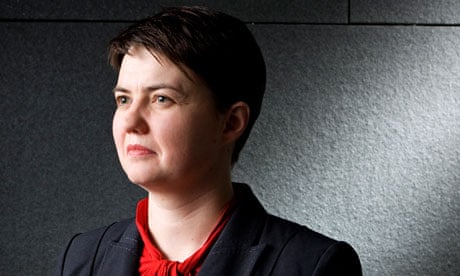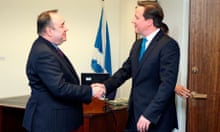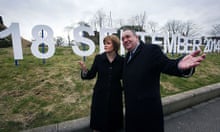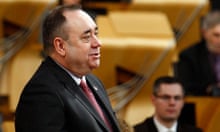David Cameron has cleared the way for the Scottish Tories to propose even greater tax-raising and political powers for the Scottish parliament, in a concerted effort to counter Alex Salmond's quest for full independence.
The Scottish Tory leader, Ruth Davidson, confirmed on Tuesday that her party now believed Holyrood should have the freedom to raise the tens of billions of pounds it spent and also take control over even more policy and law-making, potentially including some welfare spending.
In a reversal of strategy from a party which once viscerally opposed devolution, Davidson said the prime minister had agreed that the Scottish parliament should be given greater powers. The Tories would include further devolution in their 2015 general election manifesto, as part of a UK-wide strategy to re-examine the UK's constitutional framework, she said.
A new Scottish Tory devolution commission would produce detailed proposals on enhanced powers for Holyrood before the Scottish independence referendum in September 2014, she added.
She said the party had been wrong to oppose devolution during the 1990s and during the devolution referendum in 1997; she was also wrong to campaign against more devolution when she fought for the party leadership in late 2011.
During the leadership race, she had famously said the new Scotland Act, which will allow Holyrood to set income tax rates in Scotland from 2016, was "a line in the sand" and insisted she would oppose any further devolution.
Announcing that the former Tory leader of the House of Lords, Lord Strathclyde, would lead her devolution review, she said: "With the benefit of hindsight, I believe we found ourselves on the wrong side of history in 1997. We fought against the idea of a Scottish parliament long after it became clear it was the settled will of the Scottish people.
"For many, the fact we were a lone voice saying 'no' in the referendum campaign simply underlined the impression we had no real faith in our own country. It made us look as if we lacked ambition for Scotland."
Her switch in policy will more closely align the Scottish Tories with proposals for greater Scottish "home rule" coming from the Liberal Democrats and as-yet-unpublished plans from Labour to greatly increase devolution.
The party will also work with Scottish Labour and the Liberal Democrats, who are the Tories' partners in the Better Together anti-independence campaign, on a wider strategy to introduce greater devolution if the pro-UK parties win the referendum.
Davidson said that deal was crucial to ensure Scottish voters knew that if they voted "no" in the referendum, real alternatives were on the table. She wanted to win the referendum "not by an inch but by a yard", she said.
"When the referendum comes in September next year, I don't want Scots to vote in fear of what the future might hold, but in the hope for what it can bring," she said.
"A referendum campaign fought solely on the basis of fear and negativity would be no foundation upon which to build the Scotland of tomorrow … This is not a big, nationwide byelection, it's our future.
"And there will be no second chance for those who believe in the UK. We must win next year, or lose forever."
In a keynote speech in Edinburgh, Davidson made a series of admissions which point towards significant anxieties within the Scottish Tories, who have only one Scottish MP and are sitting at less than 15% in opinion polls, about their place in the devolution debate.
The Tories were in danger of allowing centre-left parties to set the pace and direction of devolution by taking charge of the independence debate, she said, squeezing out centre-right voices. The Tories had a duty to champion tax cuts, enterprise, "strong but limited" government and choice in public services.
"The framing of Scotland's future must not be left to the parties of the centre-left," Davidson said. "Strong Conservative voices must be heard in that process, and we will ensure they are."
This strategy is intended to prevent Salmond and the pro-independence movement telling voters the Tories are an obstacle to Scotland getting greater autonomy. But their opponents are now likely to focus on political divisions between the pro-UK parties or attempt to argue all three parties are hostile to Scottish interests.




Comments (…)
Sign in or create your Guardian account to join the discussion